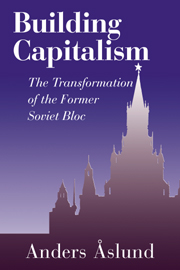Book contents
- Frontmatter
- Contents
- List of Tables and Charts
- Acknowledgments
- List of Abbreviations
- Introduction
- 1 What Communism Actually Was
- 2 The Decline and Fall of Socialism
- 3 Strategic Policy Choices
- 4 Changes in Output and Their Causes
- 5 Liberalization
- 6 Financial Stabilization
- 7 Privatization
- 8 Social Developments and Policy
- 9 State and Politics in the Transformation
- 10 Role of the Outside World
- 11 Conclusions
- Bibliography
- Index
7 - Privatization
Published online by Cambridge University Press: 15 September 2009
- Frontmatter
- Contents
- List of Tables and Charts
- Acknowledgments
- List of Abbreviations
- Introduction
- 1 What Communism Actually Was
- 2 The Decline and Fall of Socialism
- 3 Strategic Policy Choices
- 4 Changes in Output and Their Causes
- 5 Liberalization
- 6 Financial Stabilization
- 7 Privatization
- 8 Social Developments and Policy
- 9 State and Politics in the Transformation
- 10 Role of the Outside World
- 11 Conclusions
- Bibliography
- Index
Summary
Nothing has aroused more passions than privatization. It involves politics, law, justice, morals, and economics, being the fundamental dividing line between a socialist and capitalist society. No obvious precedent existed. Augusto Pinochet in Chile and Margaret Thatcher in the United Kingdom had rendered privatization a serious topic in the 1980s. The need for novel approaches contradicted the liberal reformers' battle cries, “return to a normal society” and “no more experiments.” Privatization was partly very simple, partly highly complex, and as nobody was an expert, everybody felt competent.
Privatization was so concrete, and all people wanted their own piece of property for living or work. This concreteness led to misperceptions of the value of enterprises. As state factories were badly managed, run down, obsolete, and heavily overstaffed, many were worthless smokestacks, but few understood that. Conversely, few realized the value of large financial flows, discreetly moving between bank accounts, because Marxism left an inheritance of property fetishism and a lingering contempt for finance.
Similarly, many exaggerated the importance of privatization at the expense of marketization, not realizing the limitations of formal ownership, but if the market is not liberalized, private property rights are highly limited, as was the case with the large but stifled private sector in the German Democratic Republic (Åslund 1985). While liberalization was a precondition for real property rights, many perceived privatization as primary.
Large-scale privatization was not seriously discussed in the communist world until 1988–9, but a swiftly formed consensus held it was necessary, since “public enterprises are inefficient because they address the objectives of politicians rather than maximize efficiency” (Boycko et al. 1995, p. 109).
- Type
- Chapter
- Information
- Building CapitalismThe Transformation of the Former Soviet Bloc, pp. 255 - 303Publisher: Cambridge University PressPrint publication year: 2001



